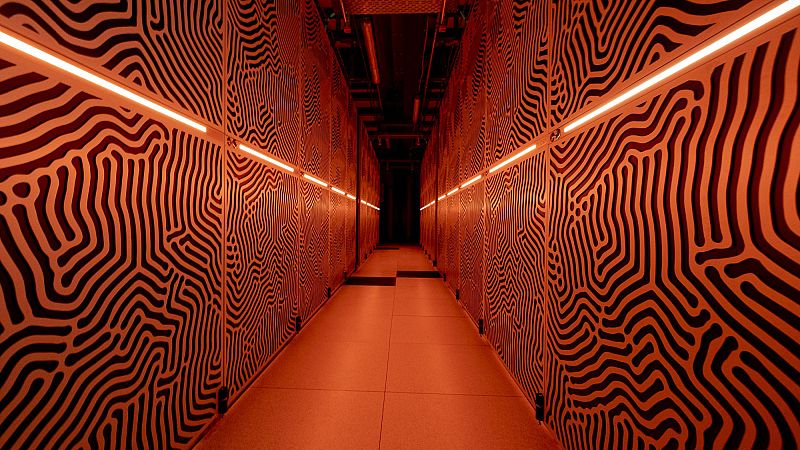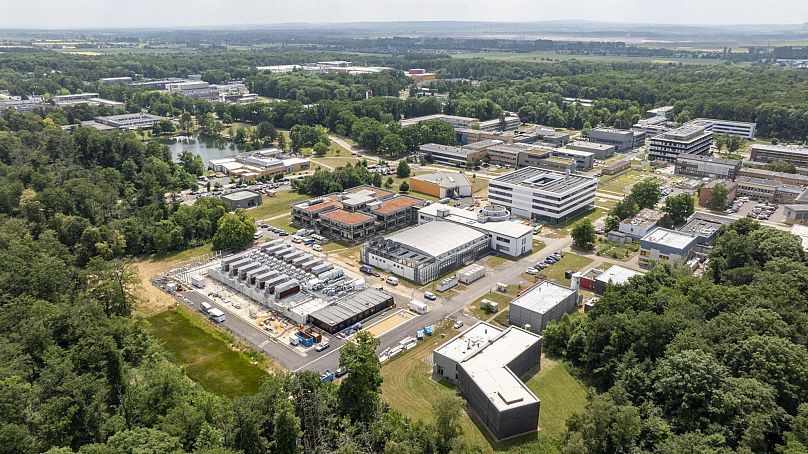What is exascale computing? The fastest supercomputer coming to Europe that will unlock AI

Europe is about to unveil its first supercomputer of the exascale class on Friday. The machine, powered by Nvidia, is said to be the “fastest in Europe,” according to the company.
The machine, called Jupiter, will be housed at the Juelich Research Centre in western Germany.
But what is an exascale supercomputer, what can it do, and why is it important? Euronews Next explains all.
What is an exascale computer?
Though it may sound impressive, it is actually just a measure of speed and how many operations per second it can achieve.
It is a computer that can perform more than 1,000,000,000,000,000,000 (1018) operations per second or more than the so-called 1 exaFLOPS. To put it into perspective, if the world’s population each completed 1 calculation per second, it would take more than four years to do what an Exascale computer can do in just 1 second.
Not only is it fast, but it is also very big. It can measure 130 metres long, 2.5 metres tall, and weigh 420 tonnes, according to EuroHPC JU, a European Union initiative that coordinates supercomputing efforts across member states, which owns Jupiter.
“The very first electronic computers back in the 1940s could perform roughly 500 operations per second, which at the time was incredibly fast,” Tim Danton, editor-in-chief of PC Pro and author of The Computers That Made Britain, told Euronews Next.
“That's 0.5 FLOPs, to use the terminology used by supercomputers. Right now, three computers in the world can perform ten to the power of 18 FLOPs, and that's the point at which they can claim to be exascale computers,” he added.
The Jupiter supercomputer ranks fourth on the June 2025 TOP500 list of the world’s fastest supercomputers and is the most energy-efficient system of the top 5 of the listing.
Why do we need an exascale computer?
Supercomputers are especially useful for researchers who want to collect and analyse data, as they can perform complex calculations much quicker, allowing them to address some of the world’s most complex problems, such as drug discovery, climate and weather forecasts, or modelling black holes.
One of the most interesting use cases for the supercomputer is that it is key to developing models used in artificial intelligence (AI).
Nvidia’s CEO Jensen Huang actually called Jupier an “AI supercomputer”.
“AI will supercharge scientific discovery and industrial innovation," said Huang.
“In partnership with Jülich and Eviden, we’re building Europe’s most advanced AI supercomputer to enable the leading researchers, industries and institutions to expand human knowledge, accelerate breakthroughs and drive national advancement,” he added.
The two fastest exascale computers include what we call AI accelerators to specifically help here, said Danton.
To break it down, “they have similarities to the graphics cards in PCs, but far, far, far more powerful and specialised,” he added.
What is the difference between super and quantum computers?
Both work in different ways.
Let’s go back to the start of this article on how every human on the planet calculates every second of every day for four years is the same as the way an exascale computer operates.
But the aim of quantum computing, which is still developing, is for computing with the simultaneous activation of binary numbers
It means that, unlike a binary system with its two possible values, 0 or 1, a qubit in superposition can be 0 or 1 or 0 and 1 at the same time.
The analogy usually given is spinning a coin: it can be both sides at the same time (we can name one side 0 and the other 1), before it lands on one side.
In quantum computing, being in multiple states at the same time means that you have an exponentially larger number of states in which to encode data. It means they have more power than traditional computers; there are exponentially larger amounts of states in which to encode data.
In short, exoscale and quantum computers work differently but they could work together.
Last week, IBM and AMD said they would work together to create a blueprint for all-powerful computers that unite quantum and high-performance computing (HPC). This would result in what is being called quantum-centric supercomputing.
The companies said that the quantum computer could tackle “behaviour of atoms and molecules” and the supercomputer would then analyse the numbers.
And that, according to Danton, “may end up being the most important announcement of the decade!”
Today


